Office of Research & Development |
 |


Lauren Carter, PhD
Geography & Environmental Science & Policy
Boston, MA
Lauren C. Carter holds a PhD in Geography and Environmental Science and Policy from the University of South Florida's Geosciences Department. Prior to that, she earned her BS and MS in atmospheric sciences and applied meteorology, respectively. Due to her multidisciplinary background, she was able to conduct research combining geographical aspects of human migration, the meteorological impacts of hurricanes, and the health impacts of COVID-19 for her dissertation. The nexus of geography, meteorology, and health thus became her passion.
As a BD-STEP fellow, Lauren is working on several VA-related projects: 1) analyzing the development of cancer in veterans after toxic air exposure from burn pits on bases overseas, 2) app development for tracking VA care for veterans with glioblastoma, and 3) finding associations between genetics and the development of liver cancer in veterans. While broadening her expertise to delve more into the healthcare field through the VA, she also participates in AMIA's Climate, Health, and Informatics Working Group to continue contributing to the field of climate and meteorology.
 Jacqueline Le Kennedy,
JD, ME, DEng
Jacqueline Le Kennedy,
JD, ME, DEng
Houston, TX
Jacqueline Le Kennedy is a BD-STEP Advanced Postdoctoral Fellow at the Center for Innovations in Quality, Effectiveness and Safety (IQuESt) of the Michael E. DeBakey VA Medical Center in Houston, Texas. Jacqueline has a Juris Doctorate (JD) from the University of California Los Angeles (UCLA), and a Master’s and Doctorate in Engineering (MEng & DEng) from the George Washington University. Her engineering graduate studies focused on cybersecurity, systems engineering, and engineering management, resulting in a doctorate dissertation that examined the usage of artificial intelligence (AI) and machine learning to reduce errors in the diagnosis of PTSD for combat soldiers and veterans.
Prior to joining the BD-STEP Fellowship, she had been working with the VA’s National Artificial Intelligence Institute (NAII) on research pertaining to Traumatic Brain Injury (TBI) and PTSD comorbidity.
With the BD-STEP Fellowship, Jacqueline will investigate Gulf-War Illness genomics using machine learning and biostatistics tools and methodologies. Jacqueline is passionate about researching the causes, diagnoses, prognoses, and epidemiology of illnesses and injuries that affect our combat soldiers and military veterans populations.
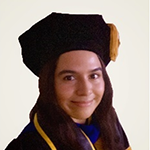 Ana I. Maldonado, PhD
Ana I. Maldonado, PhD
Clinical Psychology
Palo Alto, CA
Ana Maldonado earned her Ph.D. in Clinical Psychology from the University of Maryland Baltimore County. She trained as a predoctoral research fellow at the National Institute of Aging and the National Institute of Minority Health and Health Disparities where her research focused on understanding and preventing health disparities. Her dissertation was funded through a predoctoral research fellowship at the National Institutes of Health. Using a health disparities lens, she studied the impact of post-traumatic stress symptoms (PTSS) on changes in glucose metabolism over the adult lifespan.
She is currently a BD-STEP Postdoctoral Research Fellow at VA Palo Alto and Stanford University under the supervision of Dr. Jennifer Lee. Her current research interests are in addressing health disparities by utilizing lifespan, biopsychosocial, and intersectional frameworks to examine the connection between psychological trauma and metabolic diseases in racial/ethnic and gender minorities, particularly in individuals with multiple marginalized identities. To do so, she will leverage the rich source of longitudinal, high-dimensional health-related data on the racially diverse and trauma-exposed Veteran population.
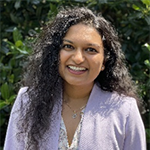 Malvika Pillai, PhD
Malvika Pillai, PhD
Health Informatics
Palo Alto, CA
Malvika Pillai, PhD is a postdoctoral research fellow in the VA Big Data Scientist Training Enhancement Program (BD-STEP), jointly in Stanford University in Medicine (Biomedical Informatics) in the Boussard Lab and VA Palo Alto. Her primary research interest is in the development, evaluation, and implementation of machine learning algorithms for clinical decision support.
Malvika received her BS in Quantitative Biology and PhD in Health Informatics from the University of North Carolina at Chapel Hill. Her dissertation research focused on computational phenotyping using natural language processing and identifying drug repurposing candidates for cancer treatment from electronic health records.
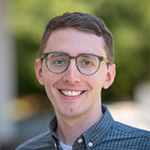 Ken Nieser,
PhD
Ken Nieser,
PhD
Epidemiology
Palo Alto, CA
Ken Nieser is a postdoctoral research fellow through the Big Data-Scientist Training Enhancement Program (BD-STEP) at the Palo Alto VA and in the Department of Surgery, Stanford School of Medicine. Ken received a BA in Physics and Mathematics from Swarthmore College and a PhD in Epidemiology with a minor in Statistics from the University of Wisconsin-Madison. During his PhD, Ken developed and applied statistical methods for improving algorithmic fairness of data analyses used to inform screening and treatment of mental illnesses. These projects included development of an approach for detecting sample subsets with differential psychological symptom patterns and a sample representation reweighting method for improving the precision of subgroup-specific treatment effect estimation.
Ken’s current research interests are in health care inequities, quality measurement, and algorithmic fairness. During his fellowship, Ken will be working on investigating the statistical reliability of quality measures and decomposing health care disparities to provide practical information for resolving inequities, with applications in mental health care and surgical care.
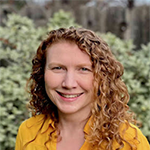 Joanna Lankester,
PhD
Joanna Lankester,
PhD
Electrical Engineering
Palo Alto, CA
Joanna Lankester, PhD is a postdoctoral fellow at Stanford University School of Medicine and a BD-STEP fellow at the Palo Alto VA. Her research focuses on causal inference of risk factors on chronic diseases, with a particular interest in women's health and reproductive health risk factors. Her postdoctoral work thus far has focused on genetically instrumented variable analysis of risk factors such as alcohol use and age of menopause on cardiovascular and oncologic outcomes. She has worked with a variety of data including Million Veteran Program, UK Biobank, and NHANES.
Prior to her postdoc, she completed her PhD in Electrical Engineering at Stanford University and subsequently worked for several years in industry as an algorithm developer and data scientist. Her expertise includes Mendelian randomization, use of genetic risk scores, simulation modeling, statistical modeling, machine learning, and cost effectiveness analyses.
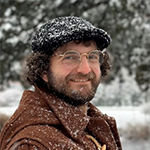 Joseph Larsen,
PhD
Joseph Larsen,
PhD
Computational Biology and Bioinformatics
Boston, MA
Joseph “Joe” Larsen is a Post-Doctoral Fellow in the Big Data Scientist Training Enhancement Program (BD-STEP) at Veterans Affairs Boston, with an appointment at Brigham and Women's Hospital Division of Aging and Harvard Medical School. His research focuses on better defining, measuring, and improving the care of veterans with cancer who are experiencing multiple chronic conditions, i.e., multimorbidity.
He graduated from the Quantitative Biology Program at the University of Southern California with a PhD in Computational Biology and Bioinformatics focusing on analyzing the progression of disease using cross-sectional data.
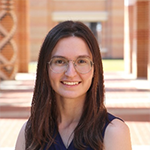 Sara Edelman-Muñoz,
PhD
Sara Edelman-Muñoz,
PhD
Theoretical Mathematics
Durham, NC
Dr. Sara Edelman-Muñoz received her Ph.D. in theoretical mathematics from Rice University. Her dissertation work focused on constructing on thin surface subgroups of non-uniform arithmetic hyperbolic groups. As a BD-STEP fellow she is using her quantitative background to improve health care processes.
She is currently a part of Cooperative Studies Program #380, a research group that is using longitudinal colonoscopy data to study genetic mutations in advanced neoplasia. Results from this project have been used to assess patients' risk of developing colon cancer and inform VA guidelines for screening colonoscopies. Dr. Edelman-Muñoz is implementing advancements in machine learning to these data to develop patient risk models and improve screening suggestions.
 Rui Ouyang,
PhD
Rui Ouyang,
PhD
Computer Science
Boston, MA
Rui Ouyang is a postdoctoral research fellow working with Dr. Nathanael Fillmore at the Massachusetts Veterans Epidemiology Research and Informatics Center (MAVERIC) at the Boston VA. Her specialities include machine learning and natural language processing algorithms, with a focus on applications of artificial intelligence for social good (AI4SG).
Prior to becoming a BD-STEP fellow, Rui earned a PhD in Computer Science from Harvard University. Her dissertation research focused on the use of natural language processing algorithms and open data sources in order to characterize both supply and demand sides of the illicit massage industry in the United States. During her graduate studies, she organized a hackathon on counter-human trafficking while working with advisors from IBM for Social Good, the Wisconsin Department of Justice, MIT Lincoln Labs, and the MIT Sloan School of Management.
In a previous life Rui received a B.S. in Mechanical Engineering from the Massachusetts Institute of Technology (MIT), founded a robotics education startup, lived on a sailboat, developed software for the Personal Genome Project, cowrote op-eds on masking, and published papers on computer-vision based touch sensors for robotic manipulation. Besides aggressively acquiring advanced technical skills, her interests include raising awareness and optimism about the overlap between engineering, science, and social justice.
 April Williams,
PhD
April Williams,
PhD
Social Behavioral Sciences
Durham, NC
April Williams is a postdoctoral research fellow in the VA Big Data Scientist Training Enhancement Program (BD-STEP) at the Durham VA. Her work during the fellowship has largely been with the Cooperative Studies Program (CSP) #380 longitudinal study: “Prospective Evaluation of Risk Factors for Large (≥1cm) Colonic Adenomas in Asymptomatic Subjects” at the Cooperative Studies Program Epidemiology Center (CSPEC) in Durham, NC. She has led investigations of associations between dietary quality and environmental risks for colorectal cancer with the goal to contribute to improving tailored screening protocols. These projects have recently expanded to the Million Veterans program where April is Primary Investigator for the study “Dietary Patterns and Environmental Risks Associated with Colorectal Cancer Incidence Among Million Veteran Program Participants.” Additionally, she has worked with the VA Tele-Oncology Evaluation Project (VOTE) to assess opportunities for automating reports for cancer care quality measures. She is also a study team member for an evidence synthesis project exploring cancer among female veterans.
April holds a Ph.D. in Social Behavioral Sciences and Certificate in Medical Education from Virginia Commonwealth University, an M.S. in Human Nutrition from the University of Bridgeport, and a B.S. in Electrical Engineering from Hofstra University.
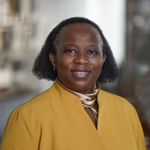 Alice Nono Djotsa,
PhD
Alice Nono Djotsa,
PhD
Epidemiology, Human Genetics and Environmental Sciences
Houston, TX
Alice NoNo Djota, PhD is a postdoctoral research fellow jointly appointed through the Big Data-Scientist Training Enhancement Program (BD-STEP) at Baylor College of Medicine (BCM)and at Michael E. DeBakey VA in Houston, Texas. At BCM, she works with Dr. Chris Amos to investigate the genetic correlation between pancreatic cancer and multiple non-cancer traits using LD Score Regression analysis and cross-trait meta-analysis. Her research with Drs. Michael Kelley and Sara Ahmed at the National Precision Oncology Program (NPOP) focuses on Non-small-cell lung cancer (NSCLC) patients where she investigates the patterns of molecular testing, targeted therapy and therapeutic outcomes in this VA population.
Alice holds a PhD in Epidemiology, Human Genetics and Environmental Sciences from UTHealth School of Public Health in Houston. Her dissertation’s research focused on functional genomic where she developed a computational gene-based permutation approach to identify cancer driver genes. She applied the method to multiple cancer types using whole genome sequencing data and was able to identify known driver genes and potential new candidate driver genes.
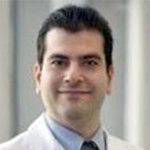 Javad Razjouyan,
PhD
Javad Razjouyan,
PhD
Biomedical Engineering
Houston, TX
Dr. Javad Razjouyan got his MSc and PhD in Biomedical Engineering. He had post-doctoral research training from University of Arizona, college of medicine and Baylor college of medicine before joining the BD-STEP fellowship program. Javad has experience in image processing, signal processing, wearable sensors, machine learning and data mining. He worked in multiple clinically important projects such as fall risk in acute settings, physiological stress assessment, physical activity monitoring, big data mining in knee osteoarthritis, sleep assessment, determining frailty status by machine learning, etc., along with pure mathematic algorithm development like Lyapunov exponent estimation by fuzzy neural network and Poincare map development in recurrent plot analysis. His current project as a BD-STEP fellow is understanding the effect of cancer therapy on the mortality and readmission of patients with congestive heart failure admission. Furthermore, he is interested in the cardiotoxicity of different cancer therapies on cardiac compensatory reserve.
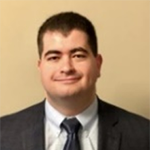 Rafael Fricks,
PhD
Rafael Fricks,
PhD
Biomedical Engineering
Durham, NC
Prior to the BD-STEP fellowship, Rafael received his BS in Biomedical Engineering from the University of Texas at Austin, specializing in imaging and instrumentation with a capstone project that integrated sensors into typodonts used to train dental students. In his graduate studies at Duke University, he applied probabilistic modeling techniques to dependability and operations problems in health care, whereby he received his MS and PhD in Biomedical Engineering. During this period Rafael interned with Siemens Healthineers, using models to predict maintenance cycles for medical imaging systems across various modalities. In his dissertation research he simulated patient flows at Duke Eye Clinics to optimize schedules at multi-clinic centers where individual doctors may see as many as 80 patients in a day.
During Rafael’s fellowship he developed and applied computer vision algorithms for visual tasks in medical imaging. By exploiting features of classification neural networks trained on natural images, he automated labeling of test patterns used to assure CT imaging system quality. Since the outbreak of the COVID-19 pandemic, Rafael pivoted to contribute to various COVID-19 projects, with 5 publications underway, including a method for improving COVID-19 classification in clinically acquired chest x-rays by supplementing new datasets with previous archives of common imaging findings.
In Rafael’s new role as a computer engineer at the National Artificial Intelligence Institute, he will organize tech sprints to engage various academic and industry partners in producing AI solutions for key issues in the Department of Veterans Affairs. Additionally, he will continue his research in deep learning in radiology by collaborating with the MAVERIC group in Boston, as well as continued involvement with the Carl E Ravin Advanced Imaging Laboratories at Duke University.
 Kyle Lafata, PhD
Kyle Lafata, PhD
Physics
Durham, NC
Kyle Lafata was a postdoctoral associate and physicist at Duke University working on medical imaging, applied mathematics, and data science. He participated in the BD-STEP fellowship with outside funding. His primary research interests were in the applied analysis of differential equations, stochastic models, and data-driven techniques to biomarker discovery, image reconstruction, and predictive analytics in cancer medicine.
Kyle received his PhD in Medical Physics from Duke University in 2018 for his research in the emerging field of Radiomics. Radiomics attempts to identify computational biomarkers hidden within high-throughput medical imaging data and may be able to noninvasively detect the underlying phenotype of certain tumors. As a BD-STEP Fellow at the Durham VA, Kyle is working to develop robust radiomic signatures that capture and encode disease response to radiation therapy. If translated into clinical practice, these image-based biomarkers would allow clinicians to identify cancer recurrences sooner, leading towards individualized modification of therapy.
Kyle graduate in 2020 and became an Assistant Professor of Radiation Oncology at Duke University. BD-STEP Events
VA and NCI coordinate biannual face to face meetings for the fellows that are typically co-located with relevant scientific conferences to maximize the educational experience. During these meetings, fellows present an update on their research findings and engage in discussions that are meant to spark collaborative projects and sharing of helpful tools. Invited speakers present relevant topics to support fellows’ training and research activities.